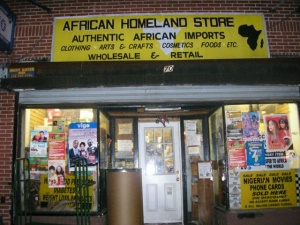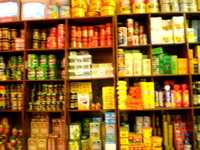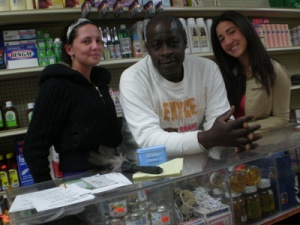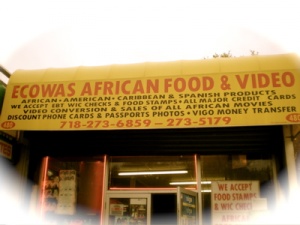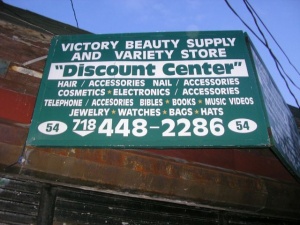Businesses
From The Peopling of New York City
Contents |
Overview
For years immigrants have come to America from all over the world looking for a piece of the "American Dream" and the immigrants from Western Africa are no different. Along the North Shore of Staten Island you can find businesses representing dozens of ethnic communities, and on this page you'll be able to sample just a few of the Western African businesses in that neighborhood.
African Homeland Store
Daniel Nkemakolam is one of the West African Immigrants who sought and found his piece of the American Dream, while still holding onto his African heritage. Over sixteen years ago he opened the African Homeland Store, a place where African immigrants can find "A Full Line Of African Imports."
Mr. Nkemakolam took about an hour out of his day to show us (Alexa and Steve) most of the products in his store. He had even postponed a phone call because he was so determined to show us as much as he could. During that time he explained how many items were prepared or used, and which of his customers were most likely to purchase it. Luckily for us, most of his customers were actually from Ghana, Liberia or Nigeria, however he sold items found all around Africa.
While looking around the store we definitely found that it really did contain a full line of goods! Not only were an innumerable amount of dry foods on the shelves, but also smoked fish and chicken, native cleaning supplies, clothing, literally black (and 100% natural) soap, games, videos, and just about anything you might need.
Targee West African Food Supplies
The distinct aroma of African spices is the first thing we, Isabella and Regina noticed as we entered “Targee West African Food Supplies Inc.” on 523 Targee Street on Staten Island. It was a medium sized room with shelves stocked to the ceiling. Different varieties of canned coco and beans were layered one on top of the other. At first glance, the store did not seem all that unusual with its freshly baked loaves of bread and Heinz ketchup bottles. However, after a stroll around the perimeter of the premises, it was apparent that this was not a typical New York deli.
West African spices, sardines, Palm oil, corned beef, soap, and fufu flour aren’t on a classic American shopping list. The store owner, a native Nigerian man named Amusa Siaka, told us that it’s not just Nigerian, Ghanaian, and Liberian immigrants who shop there. It’s a neighborhood deli that serves people from Sierra Leone and Senegal, as well as anyone else who needs anything from fresh Norwegian fish to a gallon of milk. Interestingly enough, Mr. Siaka has lived on Staten Island for twenty-two years and has four kids. The youngest is 16 and the oldest is 26; one also attends the College of Staten Island and is majoring in Communications. Mr. Siaka frequently visits Nigeria and someday hopes to rejoin his distant family and friends back in his country. He prides himself in having saved enough money to open up his own business eleven years ago, one in which the whole family partakes. From driving cabs and buses to working as a security guard, he worked incredibly hard to raise enough money to provide a good life for his family. As we both come from immigrant families ourselves, we were able to relate to his hard work and determination by seeing in our fathers the same noteworthy qualities.
He immigrated by himself to Staten Island, and his family came soon after he became acclimated. Mr. Siaka found refuge in the American Muslumanlar Birgligi Mosque, where he bonds with fellow worshipers by attending service every Friday. The Mosque was purchased three years ago and serves the people by providing a sense of community to West African immigrants that currently reside in Staten Island. Mr. Siaka went on to say that he loves attending the service every Friday because, “we pray, sing, dance, eat, and enjoy together.” Seeing how passionate he was about his connection with the mosque, one could tell just how much of an impact the religious center has on him and his overall spirit. He exclaimed that it gives him a sense of belonging, for which he is utterly grateful. The mosque, its people, and its services especially helped him when he first arrived in our country. It served as a way to keep his culture alive in a place so different than his homeland.
Ecowas African Food & Video
Visiting another family owned store, we soon realized that they sold mostly the same traditional delicacies we had seen in the other stores we had ventured to. It was called, “Ecowas African Food & Video.” Under its title, the business sign told us that they sell African American, Caribbean, and Spanish products, as well as African movies, discount phone cards, and passport photos, among other things. This establishment is located on 480 Targee Street, a couple of blocks below the aforementioned store. The young cashier was very welcoming and explained how his parents constantly visit Nigeria and how he hopes to move back to Nigeria himself, after a few years. We asked him why he was so adamant in his decision to leave Staten Island, and he told us that he felt a tie to his homeland, the large family he has there, and the life he left behind. Additionally, we asked why he and his parents decided to emigrate; we quickly learned that the advertised opportunities in the United States of America was the reason for their emigration. The young man, Tobi went on to further explain that him and his family attend the Mountain of Fire Miracles Church on Canal Street in Staten Island, and that it carries out the very important role of providing them with a sense of their homeland. Unlike the mosque that Amasu Siaka attends, The Mountain of Fire Miracles Church is comprised of people from all over the world. “We all believe and go to worship the same God so it doesn’t matter who the participants are," Tobi stated. Despite the different places of worship and the different perspectives observed, common ground could be established that cultural centers, such as churches or mosques, undoubtedly help African immigrants come together as community, and retain a sense of their culture in a place other than their homeland.
Other Points of Interest
The stores above are just a small sample of the many other businesses owned and operated by West African Immigrants in Staten Island. A trip down Bay Street, Victory Boulevard, or through the North Shore will reveal many more. For example, some other places we've visited includes Victory Beauty Supply and Variety Store, Bousso African Hair Braiding, and Korto's Place.
